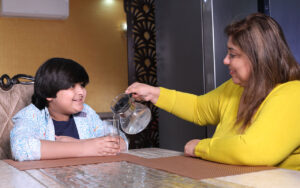Within many desi households, using ghee or too much oil in foods, as well as overfeeding the kids, has often been thought to have been the sole reason for high rates of childhood obesity amongst children of South Asian origin.
Retrospectively, many children growing up in South Asian households, would have been told to ‘fatten up’ if they were visibly skinny because being ‘mota’ or ‘moti’ automatically passed you as a healthy child.
In other words, if your cheeks didn’t look like they were holding up two round balls of gulab jamun, you were deemed as underweight, as family members and desi dieticians alike worked concordantly to get you to a ‘healthier size up’.
A good desi depiction of this stereotype occurs on the screen of India’s highest-grossing film Kabhi Kushi Kabhie Gham.

In a scene where the character of ‘Rohan’, a chubby prepubescent boy who is nicknamed ‘laddoo’ and continuously fat-shamed, is being told off by ‘Dai Jaan’, an elder aunty stereotype, for not fitting into any of his clothes, is immediately followed by the action of stuffing his face with a ‘laddoo’.
So, with these on-screen contradictions in box office Bollywood hits, it comes as no surprise that children from South Asian backgrounds are caught between the many complex behavioural and societal factors that combine to contribute to the causes of obesity.
UK Registered Dietitian for South Asians, Fareeha Jay agrees that “Children from South Asian cultures, who are obese, are reminded repeatedly of their obesity, but not given any practical help, which causes low confidence and low self-esteem among the children.”
Reports reveal that “up to 40% of childhood obesity can be explained by maternal overweight and obesity, highlighting the importance of maintaining a healthy weight prior to conception” the report reveals.
Research conducted by the programme Born in Bradford, reveals that South Asian mums were less physically active and had higher rates of gestational diabetes, which can predispose children to type 2 diabetes and childhood obesity.

Dr Marie Bryant, who is the Director of Nutrition Research for Born in Bradford says “high levels of deprivation are a contributing factor for childhood obesity in predominantly South Asian communities.
“Biologically all the stuff around us interacts with what we eat, so if we’re predisposed to be hungry all the time or not know when we’re full and we’ve got a desire to eat, and we’re surrounded by low-cost, high energy and low nutrient food, then it becomes a real challenge.”
Holding the council to account, Dr Bryant argues that “It’s about policymakers changing the environment, in which we live and providing good opportunities for children and families to access low-cost, tasty foods.”
Dr Bryant also says “The reason why we see an increased prevalence of gestational diabetes in the expectant mums of South Asian origins is because of a genetic profile, and not to do with individual behaviours necessarily.
“That doesn’t mean to say that there isn’t a role in individual behaviours, but unfortunately, biology can be attributed to the increased risk in South Asian women.”
A recent visit to the city of Bradford, where childhood obesity is a prevalent issue, was taken up by Chief Medical Officer for England, Chris Whitty, to the Al Mustafa Centre in Girlington, which implements the Born in Bradford led ‘Trailblazer Childhood Obesity Programme’.

The centre is running its own football coaching academy and youth club for younger students that attend, to reduce childhood obesity in Girlington, which is in deprivation.
Volunteer football coach Nav Hussain said “In terms of fitness, we provided water bottles from local businesses and ensure that water is the key liquid that we offer rather than drinks with a high sugar intake.
“We educate the youth on healthy eating, as we tell them to bring fruit to keep their energy levels going during practice.”
“There is a lack of awareness around healthy eating and lifestyle among the South Asian populations” adds Fareeha
Some of Fareeha’s recommendations include eating wholemeal roti, rice, poha, idli, dosa, daal (lentils/pulses) and any traditionally eaten fruit and vegetables can also be part of a healthy lifestyle.”
Advising parents to support by focussing on the overall health of their child, Fareeha says the “Strategy should be to work on healthy eating behaviours, regular physical activity and reduced sedentary activity, aiming for an average of at least 60 minutes of moderate or vigorous-intensity activity every day.”
Glossary:
Mota – masculine pronoun for a person that is large in terms of size or weight
Moti – feminine pronoun for a person that is large in terms of size or weight












